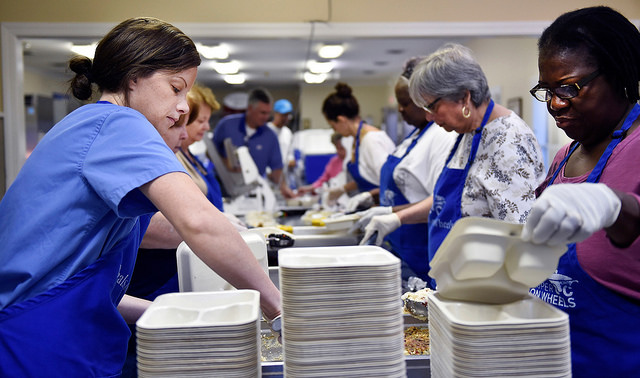
March 19, 2017; Washington Post and Good
Just as with the ACLU and Planned Parenthood, the Trump administration’s policies have prompted a dramatic surge in donations for the Meals on Wheels program. It’s another example of the phenomenon of “rage fundraising,” where the anger and concerns of donors to progressive and anti-poverty causes threatened by President Trump’s proposed policies and budget have brought about a fundraising boom.
A recent study found that delivering more meals to seniors’ homes results in fewer people going to nursing homes because those capable of living on their own with little assistance can remain at home. Meals on Wheels says it costs about $2,500 to provide a homebound senior with daily meals over one year, about the same as a one-day hospital stay or ten days in a nursing home. The program, which serves 2.4 million American senior citizens, tells CNN and the Washington Post that in one suburb, deliveries could be cut in half if the proposed elimination of the Community Development Block Grant (CDBG) program, which some states use in part to support Meals on Wheels, becomes reality.
There’s also speculation by the organization that Trump’s budget could slash the Older Americans Act, which funds more than one-third of Meals on Wheels operations, although the actual effect of the budget cuts will not be clear until more details come out. The White House also proposes cutting hundreds of millions of dollars from the Department of Health and Human Services, which includes more than $800 million annually for Meals on Wheels.
But, at the same time, donations have increased, with Meals on Wheels’ national office taking in more than 50 times what it normally raises each day since the White House released its first draft “budget blueprint” last week. The block grants fund a small portion of Meals on Wheels operations nationwide, and some of its 5,000 local branches rely on the funding to varying degrees. (A branch outside Detroit would lose a third of its budget, while one in San Jose would lose $100,000.)
The fundraising and volunteer recruitment message from Meals on Wheels is clear. “Federal funding is at risk,” says the homepage of the nonprofit’s website, “Help us defend these vital services today.” Donations to the Meals on Wheels national office will be spent on advocacy and awareness campaigns, a spokeswoman told the Post. Each local branch has its own donation sources, but they’ve reported donation surges, as well as a 500 percent increase in volunteer signups.
“It’s reassuring that the public has stepped up,” Ellie Hollander, President and CEO of Meals on Wheels America told CNN. “Cuts of any kind to these highly successful and leveraged programs would be a devastating blow to our ability to provide much-needed care for millions of vulnerable seniors in America, which in turn saves billions of dollars in reduced health care expenses.”
Sign up for our free newsletters
Subscribe to NPQ's newsletters to have our top stories delivered directly to your inbox.
By signing up, you agree to our privacy policy and terms of use, and to receive messages from NPQ and our partners.
Good, the website that reports on nonprofits and helps them market and communicate their causes, says that despite eye-catching headlines like “#LetThemDie: ‘Heartless’ Donald Trump Blasted For Killing Meals On Wheels Funds” and “Trump’s Budget Would Kill a Program That Feeds 2.4 Million Senior Citizens,” things just aren’t that simple:
Meals on Wheels is not a federal program that operates solely on federal funds. It’s not directly targeted or even mentioned in Trump’s initial budget. Rather, Meals on Wheels is a nonprofit supporting senior nutrition programs across the country that has been boosted with federal support.
Further, Meals on Wheels is not one single national organization, but an affiliation of independent operations around the U.S. There are more than 5,000 affiliates, all with different sources of funding, including government appropriations, foundation grants, individual donations, and corporate support. In one example cited in the Good reporting, San Diego’s program relies on federal funding for 35 percent of its budget, although its executive director told Good that “until we know what the cuts are going to be, I couldn’t give you a number.” And that will take a while.
Good’s stance is that “we shouldn’t be so upset about whatever Trump may do. Ultimately, individual donors have more power than the government.”
According to Hollander, Meals on Wheels has had a tremendously successful “public-private partnership,” for which every “federal dollar is matched with about three dollars from other sources.” Without question, Trump’s proposed budget is misguided at best and disgraceful at worst, and it will hurt the poor, elderly, and needy most. But to say Trump is mercilessly cutting a program that saves elderly lives is an oversimplification of the larger budget problem.
Trump’s budget blueprint is just a proposal for part of the federal budget (the administration’s full budget should be released late in the spring), and it’s important to remember that no president’s budget has ever been left intact by Congress. Both Republican and Democratic legislators have promised to protect the Meals on Wheels program. And citizen advocacy comes into play, as well. Good points out that “like many other nonprofits trying to operate in the era of Trump, [Meals on Wheels] needs help in contacting representatives to tell them that the cuts are “not acceptable.”—Larry Kaplan












